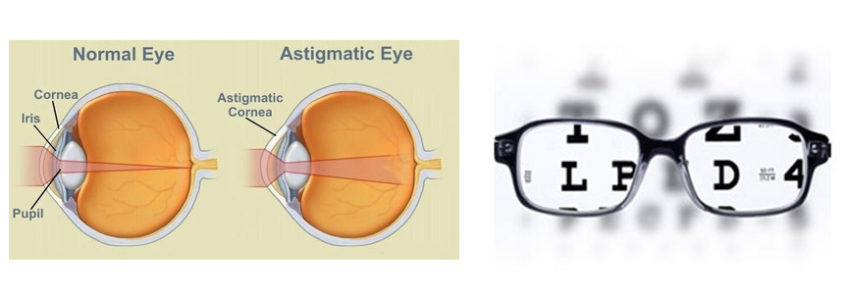Blurry Vision

Blurry vision is the loss of sharpness of vision that results in inability to see fine details. Blurry vision occurs when the function of the structure of eyes – lens, cornea, vitreous fluid, retina, optic nerve, and eye muscles – that collectively work to produce a sharp image is impaired. Abnormality in any of these structure can produce visual problems. However, abnormalities in structure outside of the eyes can also result in blurry vision like in migraine or stroke. Blurry vision may be accompanied by headache, eye pain, dryness, itchiness, photophobia, excessive tear production and loss of vision. It can affect only one eye or both eyes. It may or may not be harmful depending on the underlying condition.
Common Causes
Causes of blurry vision can be understood according to the structure involved:
- Abnormalities of the lens: These are called refractive errors.
- Nearsightedness: inability to clearly see far objects like watching TV or driving.
- Presbyopia: farsightedness due to loss of elasticity of the lens of the eye in old aged person.
- Farsightedness: inability to clearly see near objects like reading books, using computer.
- Cataracts: clouding of the eye lens. It is common in old age but other diseases can cause it in younger age
- Problem of cornea:
- Astigmatism: inability to see clearly at any distance. This is the result of irregularly shaped cornea. Abnormals shape of lens can also cause astigmatism and is called lenticular astigmatism but is less common than corneal astigmatism.
- inflammation of cornea and eyelids (keratoconjunctivitis) – herpes keratitis can be dangerous.
- Pterygium; that encroaches into cornea
- Diseases of retina:
- Macular degeneration: age related changes.
- Diabetic retinopathy: damage caused by uncontrolled diabetes
- Retinal detachment – an emergency
- Retinal vein occlusion – an emergency
- Retinal artery occlusion – an emergency
- Abnormalities of vitreous fluid: bleeding from trauma or DM,
- Abnormalities of eye muscles: usually causes double vision.
- Abnormalities of nerves and brain: Migraine and stroke.
- Others causes:
- Side effect of the medicines i.e. antihistamines (used for allergy), anticholinergics
- Pregnancy: pregnancy related hormonal changes also cause blurry vision by altering the shape and thickness of the cornea.
- Eye drops: certain medicated eye drops.
- Anticholinergics (atropine), antihypertensives, psychotropic, cortisone and oral contraceptives.
- Surgery for refractive errors: blurry vision develops immediately after refractive surgery such as LASIK (surgical procedure for treatment of astigmatism or farsightedness or nearsightedness by using a laser).
- Over-wearing of disposable contact lenses longer than prescribed time can cause blurry vision.
- Excessive use of vitamin A (Hypervitaminosis A) also causes blurred vision for temporary period.
When to visit the Doctor?
The person should immediately consult the ophthalmologist if repeatedly suffered from blurry vision. Seek immediate eye consultation if blurry vision is accompanied by:
- Redness of the eye

Image seen due to blurry vision - Double vision
- Flashing of lights
- Pain in the eye
- Significant impairment in day to day activities
- History of chronic disorders that may cause retinopathy (diabetes, high blood pressure, anemia (sickle cell).
Treatment Options
An ophthalmologist can determine the cause of blurry vision by comprehensive eye examination using Snellen chart, slit lamp examination, tonometry, refraction test and other related examination and tests. Treatment depends upon the cause:
- Antibiotic eye drops for blurry vision caused by bacterial conjunctivitis,
- Antiviral eye drops for corneal ulcer caused by herpes infection.
- Dry eye is treated initially with Artificial tears.
- Refractive errors are treated with corrective lenses (eyeglasses, contact lens) or surgical correction (LASIK).
- Cataract surgery: replacement of the old lens with a new one.
- Vitamin A should not be taken in excess amount.
- Disposable contact lens should be worn only for the period prescribed by the doctor.



Send us your feedback on this article